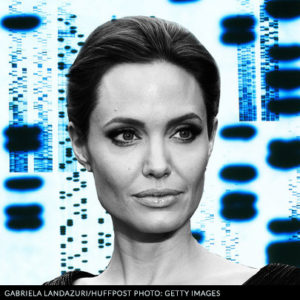The ‘Jolie Effect’ Was A Game-Changer For Breast Cancer, But It Was Just A Start

Five years ago this Monday, actress and humanitarian Angelina Jolie announced to the world in a New York Times op-ed that she is a BRCA1 gene mutation carrier, and that she underwent a preventative double mastectomy to help reduce her breast cancer risk. BRCA1 and BRCA2 are tumor-suppressing genes, and mutations of these genes elevate a person’s lifetime risk of developing breast cancer to 72 percent and 69 percent, respectively.
Jolie’s essay played a critical role in increasing awareness of both BRCA mutations and genetic testing. Her announcement had such a significant impact, scientists observed what’s now referred to as the “Jolie effect” ― genetic testing for BRCA1 and BRCA2 mutations increased by 64 percent in the three-week period after Jolie’s essay ran in the Times. Six months later, genetic testing rates remained 37 percent higher than in the four months prior to the op-ed’s publication.

